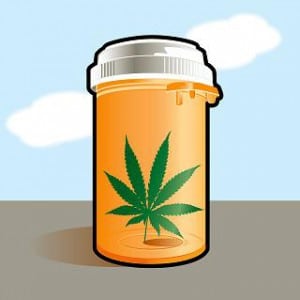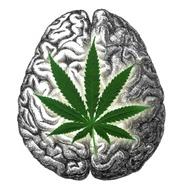
6/21/2011 by Jahan Marcu – Since 2001, Dr. Kirsten Muller-Vahl and colleagues have published research articles demonstrating the safety of Delta9-THC in patients with Tourette’s Syndrome. This is a disease characterized by involuntary movement and vocalizations (a.k.a. tics). In 2003, the authors showed that, “Delta9-THC causes neither acute nor long-term cognitive deficits” in patients suffering from Tourette’s.
Recently this group of clinical researchers published a Letter to the Editor of Psychiatry Research outlining their findings in a Tourette’s patient given 15mg of delta9-THC per day. The authors measured the patient’s driving ability with a computerized test and compared it to the patients performance with and without delta9-THC. The author’s state, “In comparison with the drug-free phase (of the treatment), there was a clear improvement in concentration and visual perception during THC therapy.”
The patient, a 42 year old truck driver referred to as Mr.H, first displayed symptoms of this disease at age 6. When he appeared at the clinic for this study he was suffering from multiple tics of the head, arm and leg: Not good symptoms to have for a truck driver. Furthermore, Mr.H’s medical history showed that all available drug treatments were ineffective including dopamine blocking agents, alpha-2 drugs, clonazepam, and terabenazine. Within 2 weeks of delta9-THC treatment Mr.H’s symptoms were reduced by 75%.
Read complete article here:
http://www.freedomisgreen.com/thc-may-improve-driving-ability-in-patients-with-neurological-diseases/
Category: Cannabis News Corner
Ten materials that could replace wood one day
By STEVE GRAHAM
www.networx.com
Whether framing a new addition, building a deck or making a piece of furniture, wood is often the go-to material. Lumber, plywood and other products made with sustainably harvested wood are widely available and relatively inexpensive. However, there are environmental costs and structural drawbacks to many traditional wood products. Plenty of creative alternatives are available. Here is a sampling of wood alternatives, most with some environmental advantages, for home construction and remodeling projects.
1. Hemp
Hemp is a fast-growing and sustainable crop that generates more construction-grade fiber per acre than most trees and other crops. It can be used in place of lumber and a wide range of other materials. For example, Washington State University researchers found hemp-based medium density fiberboard to be twice as strong as wood.
2. Bamboo
Bamboo is often considered a wood, but this grass is really a wood alternative. It has been called the world’s most useful plant (though hemp advocates might argue otherwise). Bamboo is fast-growing but at least as strong as some slow-growth woods. It is a very trendy (and somewhat controversial) flooring option. It is also used in furniture and a wide variety of other construction materials.
Read complete article here:
http://www.miamiherald.com/2011/06/20/2275079/ten-materials-that-could-replace.html#ixzz1PtM0alvB
Rep. John Conyers: Marijuana Should be Decriminalized
By Morgan Fox

At a press conference at the National Press Club on Friday, representatives of Institute of the Black World, as well as Rev. Jesse Jackson, Ethan Nadelmann of the Drug Policy Alliance, and others met to look at the impact that our nation’s failed war on drugs has had on minorities. One of the ideas mentioned most frequently to eliminate some of the negative effects of the drug war was to remove criminal penalties for possession of small amounts of marijuana.
While this is not a very radical statement, and does not address the problems associated with maintaining criminalization of the marijuana market, it is definitely a step in the right direction. It was little surprising coming from Rep. John Conyers (D-Michigan), who said he had never made such a statement before:
See video and article at:
http://www.opposingviews.com/i/rep-john-conyers-marijuana-should-be-decriminalized
Push for marijuana decriminalisation in French Polynesia
An independent member of French Polynesia’s assembly is leading a push for marijuana to be decriminalised.
The drug is making headlines in France following the release of a parliamentary report recommending its controlled legalisation.
Sabrina Birk says alcohol has been proven to be far more damaging to health and society and she can’t see why the same regulations cannot be applied to cannabis.
Read complete article here:
http://www.rnzi.com/pages/news.php?op=read&id=61292
Police raid on Gilbert, Arizona home sparks medical marijuana outcry
By Mike Sakal, Tribune
A couple hours after a DirecTV worker saw marijuana and hashish inside a bedroom closet of Ross Taylor’s Gilbert home during the installation process of a satellite dish, 12 Gilbert police officers wearing masks and toting guns busted into his house and took his pot.
Taylor, 35, is a card-carrying medical marijuana patient under Arizona’s new voter-approved law, who said he uses it for a severe loss of appetite and sleep due to post-traumatic stress disorder and anxiety.
Read complete article here:
http://www.eastvalleytribune.com/local/gilbert/article_c059bc82-9935-11e0-9ebd-001cc4c03286.html
On Its 40th Anniversary, Jimmy Carter Calls For End To Drug War
Former President Jimmy Carter recently wrote an op-ed for The New York Times to coincide with the 40th anniversary of The War on Drugs. In it he praises the recent report from The Global Commission on Drug Policy that called for an end to the Drug War.
Read complete article here:
http://the420times.com/2011/06/on-its-40th-anniversary-jimmy-carter-calls-for-end-to-drug-war/
Medical marijuana advocates set to file constitutional challenge
Kathleen Chippi, a Nederland resident and former dispensary owner, says that within the next week, she plans to file a constitutional challenge to legislation such as HB 1284, which sets up strict regulations and surveillance systems for dispensaries and other medical marijuana operations in the state. Chippi and other advocates say the new laws go too far and violate patients’ rights secured under Amendment 20 of the Colorado Constitution, which was passed by the state’s voters in 2000.
“I’m just asking that we abide by the Constitution,” Chippi says. “That’s not radical.”
Read complete article here:
http://www.boulderweekly.com/article-5805-medical-marijuana-advocates-set-to-file-constitutional-challenge.html
Does the prohibition of cannabis restrict religious freedom? Marijuana and the First Amendment
By: Simon Eddisbury

The First Amendment guarantees American citizens the right to practice their faith without the fear of prejudice. Yet, the dozen or so religious groups whose beliefs involve the sacramental use of marijuana can often find themselves on the wrong side of the law. In Christian churches, wine is often consumed as part of the service. Alcohol is arguably a far more harmful substance than marijuana, so does banning the use of cannabis in religious ceremonies constitute religious discrimination? I caught up with Carl Olsen, a marijuana activist and member of a mansion of Rastafarianism known as the Ethiopian Zion Coptic Church, to find out just how difficult it can be to practice a religion that holds cannabis sacred in a country where its use has been prohibited.
Read complete article here:
http://nugmag.com/2011/06/does-the-prohibition-of-cannabis-restrict-religious-freedom-marijuana-and-the-first-amendment/
A Card That Recognizes Marijuana As Medicine Across The EU
When in Florence
Finally, a card that recognizes marijuana as medicine across the EU
I’m here for 10 days on a rare personal mission, visiting my friend Soul Lucille without one gig, personal appearance or other responsibility beyond filing this column for the Metro Times to impede my full enjoyment of this great cultural metropolis, walking the ancient streets where once trod such incredible human beings as Dante, Boccaccio, Leonardo da Vinci, Botticelli, Machiavelli, Michelangelo, Donatello and Gallileo.
I’d been seriously disappointed on previous trips to Italy by the difficulty in finding adequate medicine after the Italian government headed by media baron Silvio Berlusconi (sort of the Rupert Murdoch of Italy) cracked down on marijuana and severely criminalized users and growers. When in Rome the first time in 2006, I met guys who were growing some very good weed where I was staying at Forte Prenestino, the 19th century army installation taken over by the autonomie movement in the 1980s. But the next time I visited, their gardens had been torn up, their growing had ended.

The only smoke I found in Italy was uniformly low-grade hashish. Someone told me that there was a single source for hash in the criminal underworld and everybody got the same stuff to peddle retail, which seemed to make sense in the society that gave “organized crime” its bad name.
Since then I’ve toured Italy extensively, playing gigs and doing readings and lectures, but nobody ever had any good weed to share, and my symptoms — physical aches and pains, mental anguish, the recurring paucity of creative inspiration — would go largely untreated until I could get back to my base in Amsterdam.
It was the same thing in France: Beyond Paris, where I had friends in the viper underground, it was difficult to find something medicinal to smoke. Last year I attended the MNOP festival — Music of New Orleans in Perigeoux — and went three days without a joint or even a whiff on the festival grounds. I suffered along with my compatriots from the 101 Runners Mardi Gras Indian funk band — and the entire New Orleans contingent — from the continuous absence of medication.
As a medical marijuana patient in Michigan, I can travel around the state that once imprisoned me for possessing two joints, and to the other 15 states that recognize cannabis as medicine as well as our nation’s capital, without fear of arrest and with a fair assurance of the availability of dosages of appropriate quality wherever I might go. This spring, my friend Ben Dronkers in Amsterdam alerted me to the benefits of medical marijuana status in the Netherlands and, by extension, the European Union.
While it’s still possible for anyone over 18, sick or well, to purchase up to five grams of cannabis over the counter at any of Holland’s 750 coffee shops, the Netherlands has also recognized marijuana as a medicine and allows for prescription by doctors and medical practitioners for a whole range of illnesses.
So I made an appointment with a doctor in Amsterdam who had been recommended to me. I showed him my Michigan patient card and explained that I would feel better if I had a prescribed dose of marijuana in my possession when I was in Holland and elsewhere in the European Union. He wrote me a prescription for 10 grams of cannabis flos to be taken at the rate of one gram per two days.
Read complete article here:
http://www.theweedblog.com/a-card-that-recognizes-marijuana-as-medicine-across-the-eu/
Feds Need To Realize That Medical Marijuana Would Help War Veterans
Posted by Johnny Green
by Al Byrne for Patients Out of Time

Between 1987 and 1992 I became involved with a Veterans Health Administration and Agent Orange Class Assistance Program that funded Vets, acting as peer counselors, to search out and offer aid to fellow Veterans. All the counselors who did the field work fought in Vietnam as did almost all of the clients or patients.
There were a small number of women in the group, all nurses of the Army and Navy. The majority of the guys were Army or Marine enlisted, a smaller number of Navy “brown water” sailors and a few from the Air Force.
My take is that the closer you came to death every day, and there were many ways to observe that act, the likelier a Vet was to be diagnosed with post traumatic stress (PTS).
I was the only counselor to have served as a Commissioned Officer and I doubled as the Contract Administrator for the multi thousand dollar grants we used to help Vets in the Appalachian region of Virginia and West Virginia. I had about 200 guys I worked with over those years.

Johnny worked at a wood yard, so did his son. His boss had called us one day looking for someone to talk to Johnny, get him some help. I showed up late one afternoon and met the boss who was younger than I and Johnny by a dozen years. Johnny was his friend as well as an employee and he was drinking himself to death I was told and it has something to do with Vietnam he was sure.
Johnny and I saw each other every week for months. He was on parole for pistol whipping some loser who thought the little guy in the corner of the bar room could be bullied. Johnny took him for a ride of terror before knocking him in the head and dumping him and his car in a big ditch. I took him for rides through the tree-lined roads of the county, away from the saws, the noise. He was drinking incessantly, doing lines of coke when he could score some and angry.
My job was to find a way to get him to talk out his pain, not physical pain for him but the emotional scars he carried along with their live-in demons. Talk we did about his homecoming, a day late he said to me, because if he had been there when the flood came he could have saved his family; father, mother, two sisters and younger brother. He was convinced that he could have saved them (or at least died with them), but the Marines had him in a stockade for acting up when he came to the states, for refusing to get a “getting out “ haircut, for telling a sergeant to go to hell. Guilt is a primary factor in PTS and Johnny had more than enough because he had not been at home when he could have been.

This was on top of a tour of duty that young 19 year old Marines like him endured in the endless jungles of danger. He was a gunner on an armored vehicle. Four fifty-caliber machine guns fired at his command with the power to blow an engine block to pieces. One night he and his friends were attacked by the enemy. In front of his guns in the morning were over 400 dead men and he was untouched he said to me, but it was 20 months of talk before he remembered that morning, that night, and when he did he cried for a long, long time.
It had not taken the counselors long to determine a trend among the Vets. Some drank to excess and, like Johnny, took any other intoxicating drug they could find. Some did not drink or do coke, they used cannabis instead.
Johnny told me he could not sleep more than a couple of hours at a time. An exhausted rest at best. He told me he could not relax, his appetite was only for alcohol and being unconscious. I urged him to use cannabis and he did. He stopped the coke cold. His alcohol intake decreased to only a few beers a day and he slept.
A cannabis researcher in Italy has coined a phrase about the endocannabinoid system. It helps us eat, sleep, relax, protect, and forget. Cannabis is the only plant that has phyto-cannabinoids (made within the plant) that are similar to the endogenous cannabinoids (made within the body) recently discovered in the human body. When I use cannabis I do not dream and I told Johnny that and I told him that he could sleep again too if he used cannabis. It would help him eat again, real food. That he could smoke a bowl and relax for a while, and concentrate on good thoughts and forget the painful images he carried in his head and while these positives were replacing the negatives, his body would enjoy a return to homeostasis from feeding his system with cannabis compounds.
Johnny called me a couple of years after I no longer worked as a counselor. He was fine now he said and wanted me to know that. “You helped me man” he said on the phone and told me he stopped drinking, was married now, his son with him and he used cannabis every day.
Read complete article here:
http://www.theweedblog.com/feds-need-to-realize-that-medical-marijuana-would-help-war-veterans/